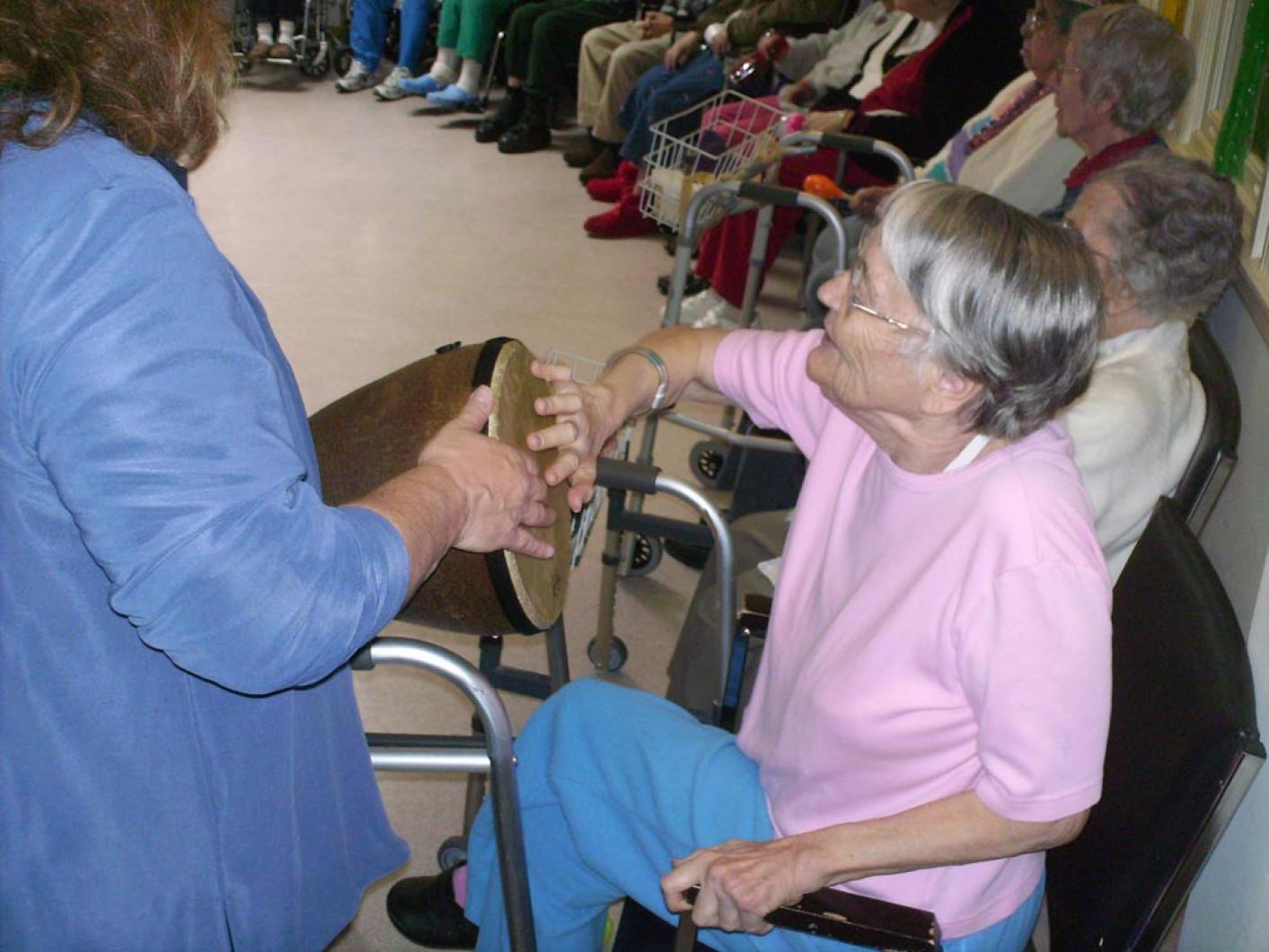Three questions came to mind as I headed out this past Friday to see Berklee College of Music students and faculty work their therapy magic on the Island. One, can you ever get high school kids to sit around and pay attention? Two, is there a career in music therapy? And three, can nursing home residents carry a beat?
For answers to these and other questions, I turned to representatives of Berklee College of Music. They were coaching and teaching an eager band of Martha’s Vineyard Regional High School students in music therapy; the students then practiced their talents with a group of Windemere nursing home residents.
First Berklee music therapist Karen Wacks explained music therapy: “With a stroke victim, or Alzheimer’s or Parkinson’s patients, we know something has happened to their brain. We work with biomedical music therapy, which can help organize the brain. With music therapy, we want to customize the music.”
Jan Wightman, department chair, added, “Several of you know people who have Parkinson’s or Alzheimer’s. This can help you, help them.”
Music therapy techniques are based in rhythm. “It’s a mind/body connection,” said Ms. Wacks. “Rhythm is most important in music therapy; first learned, last to go.”
Hymns and spirituals are simple, she noted, so people remember them. She distributed percussion instruments and, just like that, a drum circle was created.
The circle was coordinated by Wendy Krueger, a recent Berklee graduate who works as a music therapist in health care facilities. Ms. Krueger led the circle in energetic rhythmic selections. Students paid close attention, as eager to learn the beat as to not be singled out for an errant thwomp .
Ms. Wacks also told the students about career paths in the area. “Music therapy is used from prisons to community centers. At Berklee you can study voice, guitar, percussion and improvisation. In the next 10 years, every hospital will have a music therapist.”
She said in an interview, “We want to expose students to opportunities to do what they love. They don’t have to be a rock star. People create their own jobs based on need.”
The Berklee therapists were invited here by the Martha’s Vineyard Savings Bank as part of its sponsorship of the summer Vineyard Vibes concert series.
The bank’s Patti Leighton organized the program. Scanning the rapt, young faces, Ms. Leighton enthused, “This engages our future. They talk of a career path — and they can apply this to their relatives who may need it. I love it. What better way to start the day?”
The kind of music people listen to has an impact on their life, Ms. Krueger said. So therapists consider the general age of their audience to determine popular music for their programs. “As music therapists, you need a wide palette,” she said.
With their session at Windemere, the young therapists also would have to, as Ms. Krueger put it, “bridge the gap with their elders.”
As the students began to sing warm-up songs, it became clear that many of the teens did not know When Irish Eyes Are Smiling. Teacher Mike Tinus plucked away on bass as they picked up the tune.
Then it was off to Windemere, where two dozen residents were ready to rock. Twenty students filed behind the residents and formed an intergenerational music circle. This brought alive the program title, Beating the Blues Through Music.
Student Michael Kendall recalled that when his grandmother was at Windemere she enjoyed the musical events. “I like doing a nice thing for Windemere,” he said.
Ms. Wacks and Ms. Krueger led the expanded circle in song, with the students showing off their newfound rhythmic skills.
The seniors sang along, lustily. Doris Low kept the beat going. Beverley Brush requested the group sing Amazing Grace, as she beat the drum slowly. And Nathaniel Briggs led the group in Let Me Call You Sweetheart.
Martha’s Vineyard Savings Bank president Chris Wells noted how the music seemed to bring the participants alive. “The residents probably got more relief from the music than from the medications they take,” he said.
Sophomore Jake Ferry said he was “definitely” having fun. “It was not something you’d expect to help people,” he said.
Richard Leonard, the bank’s chief operating officer, admitted it did not have much to do with banking but it fitted the bank’s aim of building community. “It’s perfect. Education for the kids, and training them helps Windemere. It’s community involvement.”
Steve Lipman, assistant vice president for student affairs at Berklee, praised the bank’s commitment. “It’s unusual to have such heart” in a sponsorship deal, he said. And it worked for the college, too. “If one kid goes [to Berklee], we’ve done a mitzvah,” he said. “They’re all rock stars in my eyes.”







Comments
Comment policy »